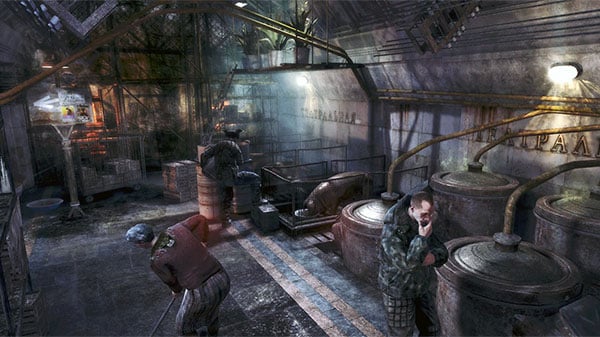|

|
| Metro Last Light Redux |
| DirecX11 Gaming Performance |
|
Metro Last Light Redux boasts some of the best 3D visuals on the PC and includes a DX11 rendering mode that makes use of advanced depth of field effects and character model tessellation for increased realism. This title also supports NVIDIA PhysX technology for impressive in-game physics effects, though we left them disabled here. We tested the game at resolutions of 2560x1600 and 3840X2160 (4K) with its in-game image quality options set to Very High and DOF effects disabled.
Metro Last Light Redux

In Metro Last Light, the X-8 regained its lead over the pack, averaging 123 frames per second at 1440p, and just over 59 fps after cranking the resolution to
4K (3840x2160). Running at 4K is a lot more demanding, and we also have the visual quality settings dialed up. Even though
NVIDIA and
AMD are not pushing multiple graphics cards (SLI and CrossFireX, respectively) as aggressively as they once were, Metro Last Light is an example of a game where having more than one GPU can smooth things out at higher resolutions.
 |
Middle Earth: Shadow of Mordor Performance
|
Glorious Orc-Slaying Vengeance
|
|
Monolith’s surprisingly fun Orc-slaying title delivers a ton of visual fidelity even at the lowest quality settings. So, to maximize eye candy while also heavily taxing the cards, we ran the game's built in benchmark with its Ultra quality settings at a couple of resolutions, topping out at 4K on these tricked-out dragster gaming PCs.
 Middle-Earth: Shadow of Mordor
Middle-Earth: Shadow of Mordor

Shadow of Mordor proved a bit of an outlier for the X-8, at least at first glance. On paper, it seems the X-8 should win out at all three resolutions tested, but it only took the top spot at 4K. Why? Because 4K is where Shadow of Mordor becomes more GPU bound.
A closer look at the numbers suggests the CPU is a bottleneck at 1440p and 1080p. Both the Cybertron CLX Ra and
Maingear Vybe Z270 were overclocked to 5GHz when we tested them. With more than enough GPU horsepower underneath the hoods of these machines, it's up to the CPU to keep up. And if that's the case, running at 5GHz would present a clear advantage over running at 4.1GHz.












